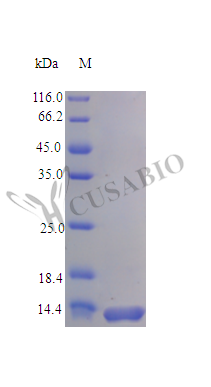This recombinant rat C-C motif chemokine protein (Ccl28) is expressed in E. Coli, covering the full length of the mature protein (20-135aa) and is tag-free. The product shows a purity of over 96% as determined by SDS-PAGE and exhibits full biological activity. It appears to be validated in a chemotaxis bioassay using human lymphocytes with activity in the range of 5.0-50 ng/ml. The endotoxin level remains at less than 1.0 EU/µg, which likely ensures high-quality research applications.
Ccl28, a member of the C-C motif chemokine family, seems to play a crucial role in immune response by mediating the chemotaxis of lymphocytes to mucosal tissues. It may be involved in both innate and adaptive immunity. Its relevance to mucosal immunology research appears significant. Understanding its expression and regulation could be important for investigating various physiological and pathological processes in the immune system.
Potential Applications
Note: The applications listed below are based on what we know about this protein's biological functions, published research, and experience from experts in the field. However, we haven't fully tested all of these applications ourselves yet. We'd recommend running some preliminary tests first to make sure they work for your specific research goals.
1. Chemotaxis Assay Development and Optimization
This recombinant rat CCL28 protein is confirmed to be biologically active in human lymphocyte chemotaxis (active at 5.0-50 ng/ml) and suitable as a positive control. However, researchers should validate its activity in rat-specific lymphocyte populations to confirm that cross-species reactivity is consistent. The high purity (>96%) supports reliable dose-response studies, but optimal concentrations may need adjustment for primary rat lymphocytes due to potential species-specific receptor affinity differences.
2. Cross-Species Chemokine Activity Studies
The demonstrated human lymphocyte activity enables valid cross-species comparisons, but researchers should note that CCL28 typically shows species-specific receptor preferences (primarily CCR10 in humans). Comparative studies should include validation in both human and rat receptor systems to properly interpret functional conservation. The relatively narrow activity range (5.0-50 ng/ml) suggests good potency for meaningful comparisons.
3. Antibody Development and Validation
This high-purity, full-length mature CCL28 (20-135aa) serves as an excellent antigen for antibody development. However, antibodies should be validated against native rat CCL28 from mucosal tissues to ensure recognition of physiologically relevant forms, as E. coli expression lacks mammalian glycosylation patterns that may affect some epitopes in this heavily glycosylated chemokine.
4. Receptor Binding and Competition Assays
The biologically active CCL28 is suitable for CCR10 binding studies, but researchers should note that rat CCL28 may have different receptor binding profiles than human CCL28. Binding assays should account for potential species-specific differences in CCR3/CCR10 affinity. The established activity range provides a good starting point for competition studies, but species-matched receptor systems should be used for accurate affinity measurements.
5. In Vitro Mucosal Immunity Research Models
This CCL28 is appropriate for mucosal immunity studies, but the cross-species activity data requires validation in rat-specific mucosal models. Researchers should establish dose-response relationships in rat mucosal lymphocytes to ensure physiological relevance, as human lymphocyte responses may not directly translate to rat mucosal immunity mechanisms.
Final Recommendation & Action Plan
This recombinant rat CCL28 protein demonstrates good biological activity in human lymphocyte chemotaxis with a favorable potency range (5.0-50 ng/ml), making it suitable for the proposed applications with appropriate species-specific validation. First, establish activity in rat-specific lymphocyte populations and mucosal tissue models to complement the human cell data. For comparative studies, the narrow activity range supports meaningful potency comparisons but includes both human and rat CCL28 proteins tested in parallel systems. When developing antibodies, account for the heavy glycosylation of native CCL28 by validating against mammalian-expressed protein. For mucosal immunity research, the low endotoxin content is particularly valuable, but validated for physiological relevance in rat-specific models. The E. coli expression produces a non-glycosylated protein, which is a significant limitation for CCL28 studies, as native CCL28 is heavily glycosylated - critical findings should be verified with a glycosylated protein when possible. Always include species-matched controls and consider that CCL28's unusual dual-receptor specificity (CCR10/CCR3) may lead to complex species-specific binding characteristics.




